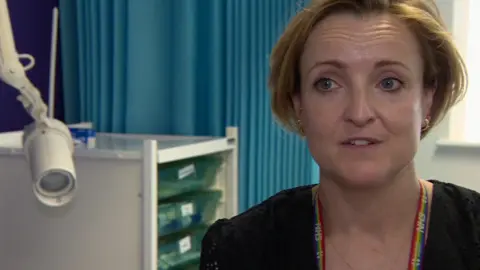2 hours ago
By Karl Mercer, Political correspondent, BBC London

 BBC
BBC
Streatham GP Lucy Goodeve-Docker said the situation had been "incredibly tricky"
Doctors' surgeries in London have continued to struggle with the impact of a cyber attack that knocked out pathology services across the area.
Synnovis, an agency which manages labs for NHS trusts and GPs in south-east London, was the victim of a hack on 3 June.
It has led to the cancellation of thousands of operations and appointments.
Blood testing remains at a fraction of its former capacity, with only urgent and critical cases being processed.
Lucy Goodeve-Docker, a GP in Streatham, said the situation had been "incredibly tricky".
The practice, which used to process up to 200 tests a day, is now only managing 15 to 20.
Dr Goodeve-Docker said: "We had to pause our blood testing - we were told we only had access to critical blood tests.
"And when we do not have access to blood tests, then we are working with uncertainty, that something might have changed.
"We would normally, for those patients, be doing blood tests maybe every two or three months.
"So although it's only been a few weeks without access, we are already building up a bit of a mountain of repeat patients we need to catch up with."
Meanwhile, the British Medical Association (BMA) has defended doctors striking at hospitals running at reduced capacity due to the significant cyber attack.
While some junior doctors have been granted special permission to return to work due to safety concerns, a number have continued with their industrial action at trusts in London hit by the attack.
The BMA has defended its actions with a senior official saying the cyber attack had "nothing to do with the dispute” which was with the government over pay.
Speaking at the picket outside St Thomas’ Hospital, Dr Robert Laurenson, co-chairman of the BMA’s Junior Doctors Committee, said: "We’ve listened to the concerns of the trusts, that’s why we’ve granted a derogation (an exemption) to multiple trusts in south-east London."
Another doctor said patient safety was "paramount", and confirmed junior doctors would return to work should concerns be raised by NHS trusts.
Asked about the impact of the cyber attack, Prof Sir Stephen Powis, national medical director of NHS England, told the BBC it would take weeks to get back to normal after "the malicious criminal act".
He added: "We have invested over £350bn centrally in the NHS in cyber security since 2017 and of course we have strict standards that we expect suppliers to the NHS to meet in terms of cyber security - but these threats are increasing all the time."
 (1).png)
 6 months ago
13
6 months ago
13













